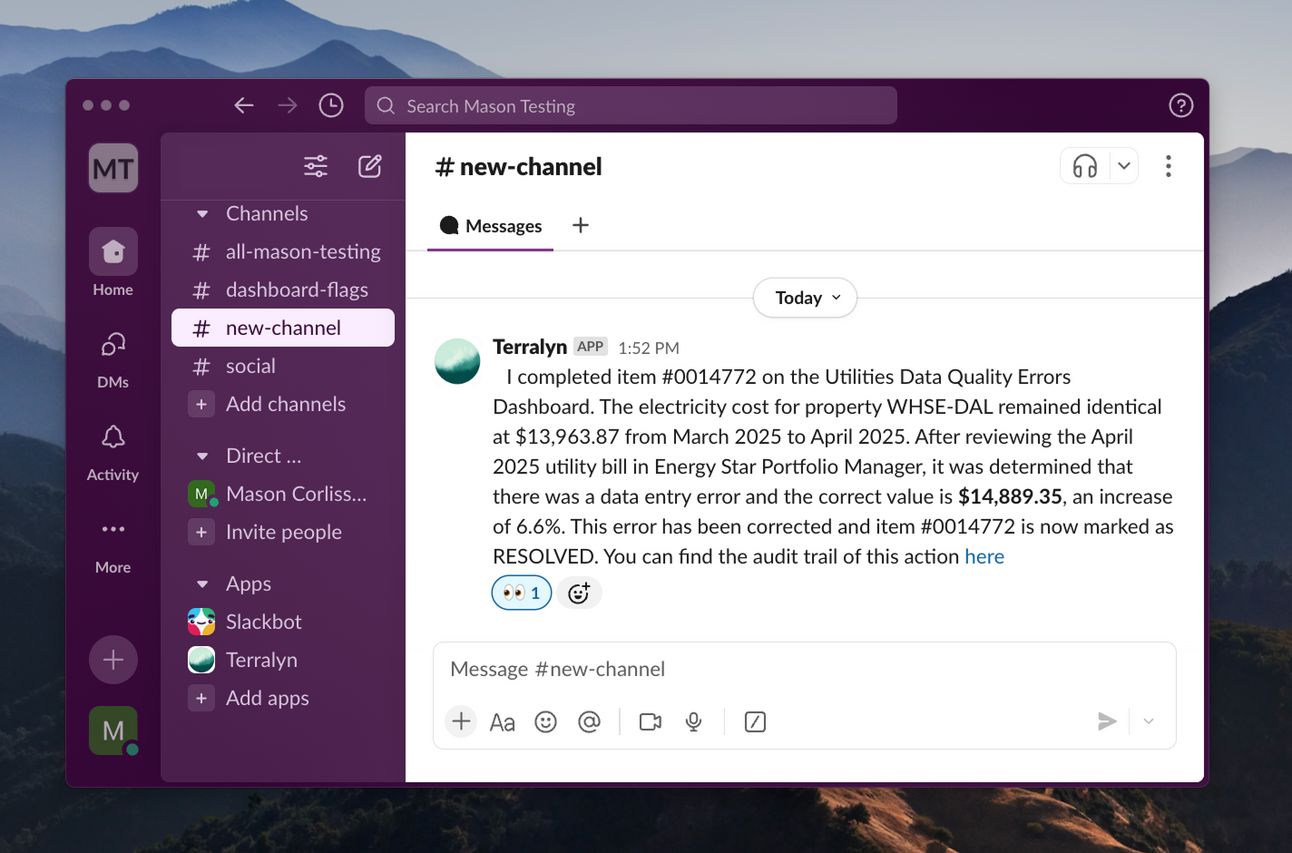- The Green Executive Briefing
- Posts
- ESG Lingo: Are We Saying The Same Thing?
ESG Lingo: Are We Saying The Same Thing?
➡️ 2 New Spotlights: 🌟 Terralyn.ai, Sustainability Pros Create Impact, Not Reports & The Sustainable Storytelling Sprint by Solarpunk Studio


This week’s reading time: 5 minutes
Welcome to another edition of The Green Executive Briefing. In under 10 minutes, you’ll be fully updated on the latest happenings in Sustainability and ESG every Tuesday at 8am EST. 🌎
We sift through a vast array of articles and data from trusted sources, distill the information, and present it to you in simple, bite-sized pieces every week. 🌍
Subscribe Today 🌍
Topics For Today:
Precision in ESG language is strategic, not semantic – Using terms correctly impacts compliance, credibility, and business outcomes
Commonly interchanged terms create dangerous confusion – Misuse can undermine genuine sustainability efforts and create risks for organizations
Understanding distinctions is essential for all stakeholders – Whether you're an investor, sustainability professional, or business leader, clarity in terminology drives effective communication and meaningful action
More Readings
🌟 Spotlight: Terralyn.ai, Sustainability Pros Create Impact, Not Reports

Sustainability professionals create impact, not reports.
If this is the case, then why are teams spending >50% of their time handling data and reporting demands to comply with every XYZ acronym framework?
Sustainability platforms can help streamline 80% of the work, but the 20% gap is widening.
Your day is probably shuffling between systems: Email ↔️ Data warehouses ↔️ Carbon accounting platform ↔️ Excel ↔️ Reporting platform
Excel… so much work to be done in Excel
This is where we come in: Terralyn is building the first AI sustainability analyst for corporate sustainability teams, automating end-to-end workflows for data collection, data quality, analytics, and reporting—completing tasks, like a teammate, in the background 24/7.
If you can write a workflow as a list of steps, Terralyn can automate it
Terralyn is opening a private beta program for sustainability professionals where our team of experts will integrate Terralyn’s agentic capabilities into your daily workflows. If you are interested in participating, we would love to hear from you!
Feel free to find some time on my calendar link: https://calendly.com/terralyn/meeting-with-mason-at-terralyn
Mason Corliss
Founder, Terralyn
Want to get featured in the spotlight? Reply to this email: [email protected]
Looking for unbiased, fact-based news? Join 1440 today.
Join over 4 million Americans who start their day with 1440 – your daily digest for unbiased, fact-centric news. From politics to sports, we cover it all by analyzing over 100 sources. Our concise, 5-minute read lands in your inbox each morning at no cost. Experience news without the noise; let 1440 help you make up your own mind. Sign up now and invite your friends and family to be part of the informed.
🌟 Spotlight: The Sustainable Storytelling Sprint by Solarpunk Studio
Your sustainability work deserves so much more than a checkbox—it deserves a narrative that builds trust, secures buy-in, and sparks real momentum.
The Sustainable Storytelling Sprint™ from Solarpunk Studio is a two-day immersive workshop and content creation experience designed for sustainability, ESG, and communications teams. Solarpunk Studio helps mid-sized to enterprise-level organizations translate their internal initiatives into audience-ready narratives—aligned with ESG frameworks and stakeholder priorities.
✔️Align your messaging with carbon, waste, and equity goals
✔️Train your team in visual and strategic storytelling
✔️Walk away with six months of premium, ready-to-use video and content assets
Whether you’re preparing for a report, campaign, or executive briefing, we’ll help you showcase progress with clarity and credibility.
Book a discovery call and mention the special discount for Green Executive Briefing subscribers: https://app.hellobonsai.com/s/solarpunk-studio/discovery
Want to get featured in the spotlight? Reply to this email: [email protected]
Intro
🌍 𝗘𝗦𝗚 𝗟𝗶𝗻𝗴𝗼: 𝗔𝗿𝗲 𝗪𝗲 𝗦𝗮𝘆𝗶𝗻𝗴 𝘁𝗵𝗲 𝗦𝗮𝗺𝗲 𝗧𝗵𝗶𝗻𝗴?
In the rapidly evolving world of sustainability and ESG, precision in language isn't just about semantics—it's about strategy, compliance, and credibility. As organizations rush to demonstrate their commitment to responsible business practices, many terms are thrown around interchangeably, creating confusion that can undermine even the best intentions.
Whether you're a sustainability professional, investor, or business leader, understanding these distinctions is crucial for effective communication and meaningful action. Here's your guide to navigating the most commonly confused terms in the ESG landscape.
Main
📌📊 The Framework vs. The Philosophy
💡 ESG ≠ Sustainability
While often used as synonyms, these terms serve different purposes:
ESG (Environmental, Social, Governance) is a structured, measurable framework designed primarily for investors to assess company performance and risk
Sustainability represents a broader philosophy of long-term viability, encompassing everything from resource management to intergenerational equity
Think of ESG as the scorecard and sustainability as the game itself. One measures specific metrics; the other encompasses an entire approach to business and society.
Main
📌Climate Action Terminology
💡 Carbon Neutral ≠ Net Zero
The distinction here can mean the difference between genuine climate action and greenwashing:
Carbon Neutral typically allows for heavy reliance on carbon offsets to balance emissions
Net Zero demands deep, science-based emissions reductions first, with offsets used only for hard-to-abate emissions
Companies claiming carbon neutrality might simply be buying their way out of the problem, while net zero commitments require fundamental operational changes.
Main
📌GHG Emissions ≈ Carbon Footprint
These terms are similar but not identical:
GHG Emissions encompass all greenhouse gases: CO₂, methane (CH₄), nitrous oxide (N₂O), and fluorinated gases
Carbon Footprint often focuses primarily on CO₂, though modern usage increasingly includes all GHGs
When setting targets or reporting progress, specify which gases you're measuring to avoid confusion.
Main
📌 Corporate Responsibility Evolution
💡 CSR ≠ ESG
This distinction reflects the evolution of corporate responsibility:
CSR (Corporate Social Responsibility) is typically values-driven, voluntary, and focused on philanthropic activities
ESG is data-driven, increasingly mandatory, and directly tied to business risk and opportunity assessment
CSR asks "How can we give back?" while ESG asks "How do our operations impact stakeholders and our bottom line?"
Main
💡 Reporting and Transparency
💡 Sustainability Reporting ≠ ESG Reporting
The content and audience differ significantly:
Sustainability Reports often include narrative elements, community engagement stories, and broad CSR initiatives
ESG Reports focus on decision-useful data aligned with frameworks like GRI, ISSB, or TCFD, targeting investors and regulators
One tells a story; the other provides standardized metrics for comparison and analysis.
💰 Investment Approaches
💡 Impact Investing ≠ Sustainable Investing
The intent and measurement differ:
Impact Investing actively targets measurable positive change, accepting potential trade-offs in returns
Sustainable Investing screens for ESG risks or avoids harmful sectors while maintaining competitive returns
Impact investors seek to change the world; sustainable investors seek to avoid funding its destruction.
Main
🔍 Additional Distinctions to Watch
➡️ Materiality ≠ Risk Assessment
Materiality identifies which ESG issues matter most to stakeholders, while risk assessment evaluates potential business impacts.
➡️ Green Economy ≠ Circular Economy
Green focuses on environmental sustainability; circular specifically targets waste elimination and resource regeneration.
➡️ Assurance ≠ Verification
Assurance provides broader confidence in reporting processes; verification confirms specific data points or claims.
📌 Why This Matters
Using these terms correctly isn't pedantic—it's professional. Misuse can lead to:
Regulatory scrutiny and potential greenwashing accusations
Misaligned stakeholder expectations
Ineffective strategies based on misunderstood concepts
Lost credibility with increasingly sophisticated audiences
WRAPPING UP
🔮 CLOSING THOUGHT: Moving Forward Together
As we collectively work toward a more responsible and resilient future, speaking the same language is essential. These distinctions help us:
Set clearer goals and expectations
Measure progress more accurately
Communicate more effectively with diverse stakeholders
Build trust through precision and transparency
The next time you're in a meeting where someone uses "ESG" and "sustainability" interchangeably, or claims "carbon neutral" status through offsets alone, you'll have the knowledge to guide the conversation toward greater clarity and impact.
P.S. When you’re ready, here’s how I can help you:
Download our Dashboard GHG Accounting Scope 1, 2 & 3. Customize it with your organization's numbers to build a compelling business case.
Refer 2 other sustainability leader (see “Click to Share” button below)
Book a Consultation: Click HERE
GHG Accounting Strategies (Scope 1, 2 & 3)
ISO 14001 Compliance (Environmental Management)
Did you like today's email?Let me know what you thought so I can make the next email even better. |
CREDITS


